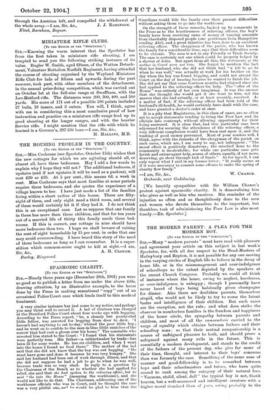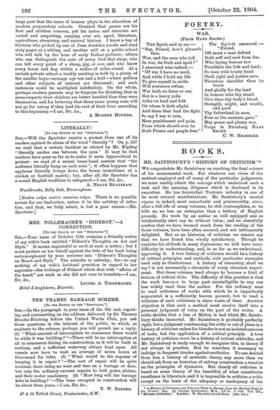[TO TILE EDITOR OF THE "SPECTATOR. "] SIR,—Many "modern parents" must
have read with pleasure and agreement your article on this subject in last week's Spectator, for, with all due respect to the Head-Masters of Haileybury and Repton, it is not possible for any one moving in the varying circles of English life to believe in the decay of home life, or in the mismanagement and over-indulgence of schoolboys to the extent depicted by the speakers at the recent Church Congress. Probably we could all think of instances where the home, owing to neglect, harshness, or over-indulgence, is unhappy ; though I personally have never heard of boys being habitually given champagne for dinner. Also there are doubtless parents, themselves stupid, who would not be likely to try to rouse the latent tastes and intelligence of their children. But such cases are the exception, not the rule ; and what does strike the observer in numberless families is the freedom and happiness of the home circle, the sympathy between parents and children, and most of all the camaraderie carried to the verge of equality which obtains between fathers and their schoolboy eons : so that their mutual companionship is a source of unfeigned pleasure to both, and should prove a safeguard against many evils in the future. This is essentially a modern development, and stands to the credit of the fathers of the present day, who give far more of their time, thought, and interest to their boys' concerns than was formerly the case. Something of the same ease of manner and good-fellowship is to be remarked between boys and their schoolmasters and tutors, who have quite ceased to rank among the category of their natural foes. " Vacuous, stolid, silent, dull " the typical boy is not, thank heaven, but a well-mannered and intelligent creature with a higher moral standard than of yore, owing probably to the modern preparatory schools. Granted that games are his POETRY. first and chiefest concern, yet his tastes and interests are varied and surprising, ranging over art, sport, literature, agriculture, chemistry, and natural history. I know a boy of thirteen who picked up one of Jane Austen's novels and read sixty pages at a sitting, and another still at a public school who will talk by the hour of early Italian pictures ; others who can distinguish the note of every bird that sings, who can tell every point of a sheep, pig, or cow, and who know every horse and dog within a radius of miles round. At a certain private school a weekly meeting is held by a. group of the smaller boys—average age ten and a half—where politics and other subjects of interest are discussed ; and such instances could be multiplied indefinitely. On the whole, perhaps modern parents may be forgiven for thinking that in some respects their children are better handled than they were themselves, and for believing that these same young sons will not go far astray if they lead the rest of their lives according to this beginning.—I am, Sir, &c., A MODERN MOTHER.











































 Previous page
Previous page